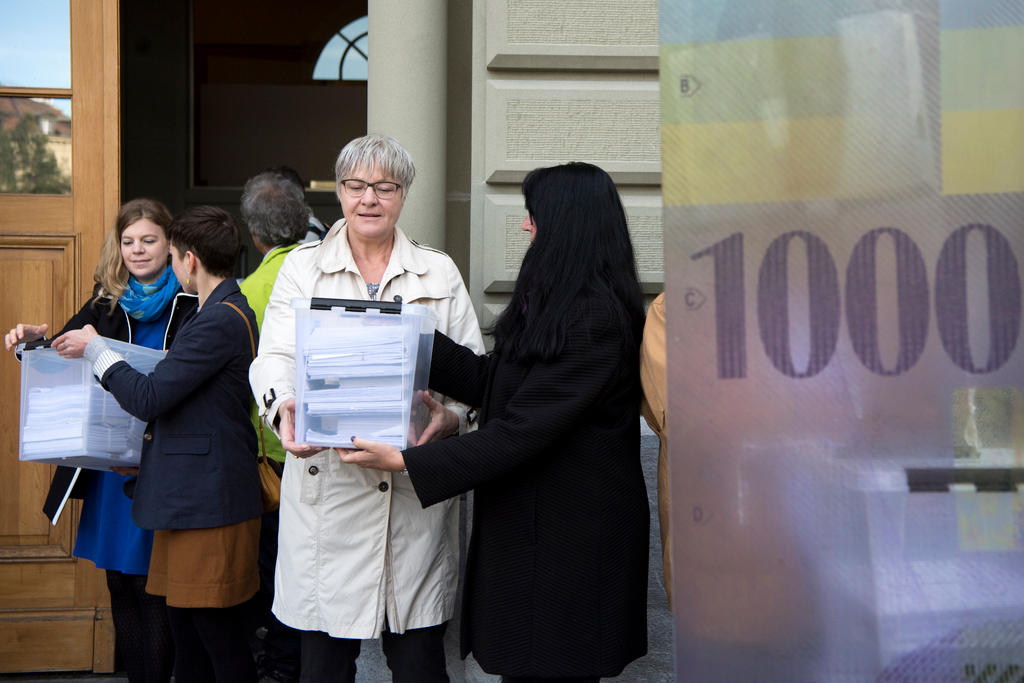
Vote upsets boost drive for greater political transparency

A proposal seeking nationwide rules for the funding of political parties has been given a boost following surprising cantonal ballot box victories on this issue last weekend, says Oscar Mazzoleni, a political scientist from Lausanne University.
On March 4, 68.5% of voters in the western canton of Fribourg approved an initiative by the youth chapter of the Social Democratic Party calling for greater financial transparency by parties.
In canton Schwyz, a traditionally conservative region in central Switzerland, voters backed a similar initiative proposed by the small and high-profile leftwing Young Socialists. It was a narrow victory -50.3% in favour – of around 300 votes.
This was the first time that an initiative for greater financial transparency in politics had gained voters’ backing in Switzerland’s main German-speaking region. As a result, the Young Socialists are now considering a similar move in Basel City.
So far, only three cantons in the French and Italian-speaking parts of the country – Geneva, Neuchâtel and Ticino – have already introduced rules on political transparency. However, cantons Basel Country and Aargau – both in German-speaking Switzerland – threw out similar proposals in 2013 and 2014, respectively.
At the federal level, a cross-party committee last October handed in enough signatures for a nationwide vote on the issue. The government has outlined its opposition to the proposal, while parliament must still discuss the initiative before a date is set for a vote on a constitutional amendment.
swissinfo.ch: To what extent will last weekend’s two cantonal votes on political transparency boost the chances of a proposal for a nationwide vote on this issue?
Oscar MazzoleniExternal link: First, we should say that the initiatives in Fribourg and Schwyz were not identical. They both have their own particularities. The national people’s initiative calling for greater transparency is different again.
What they do have in common is that they show an increasing gap between two policy principles. On the one hand, there is the traditional view that political parties are private organisations and the state must not intervene in private matters.
On the other hand, there are calls for strict rules about the funding of political parties and their campaigns. In addition, pressure for greater transparency is mounting at the international level and among the media.
The votes in Fribourg and Schwyz were two successful public test cases.
The federal government and the centre-right majority in parliament are taking a risk if they continue to take a hard-line stance on this issue in the campaign on the nationwide transparency initiative.
It is a window of opportunity for those who want reforms or regulations. However, those people defending the status quo must think long and hard about what arguments they want to use to convince voters.
swissinfo.ch: The government rejects the people’s initiative for more transparency on political funding at the national level, despite repeated calls by the Council of Europe’s anti-corruption body, the Group of States against Corruption (GRECO), to review funding rules in Switzerland. Why is this?
O.M.: Up to now, the government has defended the position of the majority in parliament. Rules are not necessary, according to parties on the right and the centre-right.
Another reason against regulations is the Swiss federalist system, which grants the cantons wide-ranging autonomy. Election campaigns take place essentially at a cantonal level.
An intervention by the national authorities on these matters is considered a breach of Swiss traditions.
In the past, the government has repeatedly rejected GRECO recommendations.
swissinfo.ch: Opponents say the votes in Fribourg and Schwyz are due to special circumstances. They argue that they were protest votes against the authorities following the recent revelations about suspected financial irregularities at the state-run company, PostBus, or cases of alleged tax-dodging by some politicians. How credible are these arguments?
O.M.: I’m convinced that the relationship between ethics and politics is becoming increasingly important for the public. This is especially the case in the context of alleged political scandals which directly or indirectly involve political parties or their representatives.
But this is an international phenomenon, and there’s nothing specifically Swiss about it.
The greater insistence on ethical standards is particularly common in debates about salaries and politics. One way of tackling the perceived problem between ethics and politics is to call for more transparency.
This is a recurrent pattern, not only in Switzerland. But it is difficult to say whether the cases mentioned had a decisive impact on the votes in the two cantons.
Public opinion tends to veer in this direction in the current political climate. There is increasing public attention on this relationship between morals and politics, especially because of the new means of information.
Last weekend, numerous cantonal and communal votes took place in many of the 26 cantons.
Voters in Basel Country threw out a proposal to lower the voting age from 18 to 16 years old.
In cantons Zurich and Bern, voters rejected proposals to grant parliaments a bigger say in educational programmes, preventing the introduction of common school syllabi in the German-speaking cantons.
Elections to the Zurich city council and the local parliament saw the political left boosting its power at the expense of centrist and right-wing parties.
Elections also took place in cantons Glarus, Obwalden, Nidwalden and Fribourg.
Adapted from Italian/urs

In compliance with the JTI standards
More: SWI swissinfo.ch certified by the Journalism Trust Initiative





























You can find an overview of ongoing debates with our journalists here . Please join us!
If you want to start a conversation about a topic raised in this article or want to report factual errors, email us at english@swissinfo.ch.